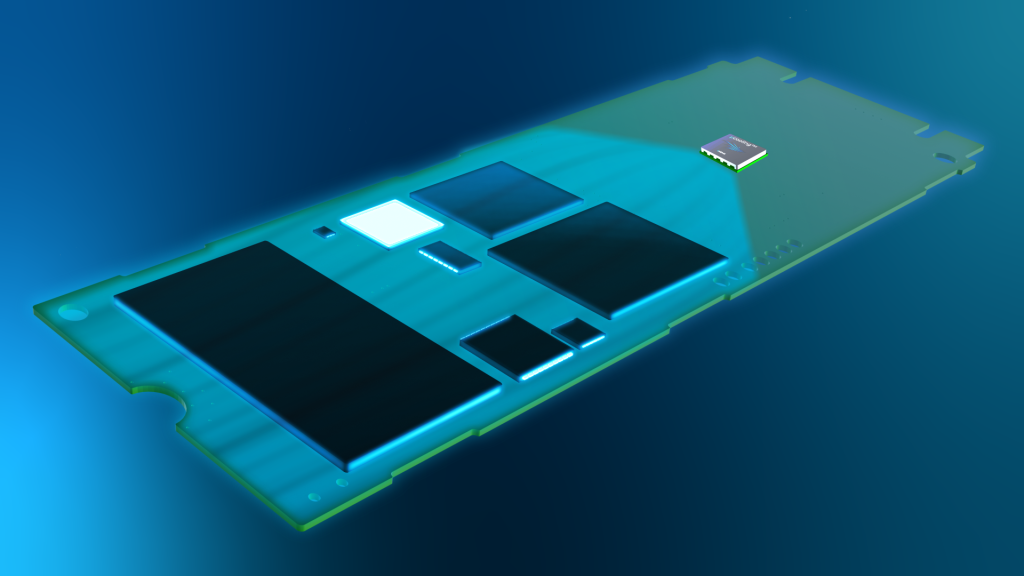
Revolutionizing SSD Thermal Management: xMEMS Introduces µCooling Fan-on-a-Chip for AI Data Centers and Laptops
In the rapidly evolving world of high-performance computing, thermal management remains a critical challenge. Solid-state drives (SSDs), the backbone of modern data storage, are particularly susceptible to overheating under intense workloads. To address this issue, xMEMS Labs, Inc., the pioneer behind the world’s first monolithic silicon MEMS air pump, has announced the expansion of its groundbreaking µCooling fan-on-a-chip platform to SSDs. This innovation introduces the first-ever in-drive active cooling solution, designed to revolutionize thermal management for enterprise E3.S form factor SSDs used in AI data centers and NVMe M.2 SSDs found in consumer laptops.
The Need for Active Cooling in SSDs
As SSD speeds continue to push beyond 7 GB/s, thermal throttling has emerged as a significant performance bottleneck. Traditional thermal management methods, such as passive heat spreaders and reliance on ambient airflow from system fans, often fall short in handling the sustained, high-intensity workloads common in artificial intelligence (AI), high-performance computing (HPC), and modern consumer applications. Overheating not only degrades performance but also reduces the lifespan of SSDs, making effective cooling essential for maintaining reliability and efficiency.
With µCooling, xMEMS delivers a hyper-localized active cooling solution that integrates directly into the SSD. By targeting NAND flash and controller ICs, the components most prone to overheating, µCooling ensures thermal relief precisely where it’s needed—preventing throttling and enabling sustained peak data rates.
Transformative Benefits for AI Data Centers
In AI data centers, E3.S form factor SSDs are frequently subjected to workloads exceeding 9.5W TDP, creating thermal hotspots within densely packed server racks. Thermal modeling conducted with µCooling integration demonstrates impressive results:
- 3W of heat removal capability
- >18% average temperature reduction
- >25% lower thermal resistance
These improvements allow SSDs to maintain high-speed I/O operations without performance degradation, extending device reliability and enhancing throughput for critical AI/ML workloads. For hyperscale data centers, where every degree of temperature reduction translates to improved efficiency and cost savings, µCooling represents a game-changing advancement.
Enhancing Performance in Consumer Laptops
For consumer devices, particularly ultrathin laptops with NVMe M.2 SSDs, thermal management is equally critical. These devices often lack robust cooling systems, making them prone to overheating during large file transfers, sustained write operations, or gaming sessions. With µCooling integrated, thermal modeling shows remarkable enhancements:
- 30-50% power overhead allowance
- >20% temperature reduction
- 30% lower thermal resistance
- 30% lower ∆T (temperature rise above ambient)
These benefits translate to fewer thermal slowdowns and higher sustained performance, even in compact, fanless designs. Whether you’re a gamer, content creator, or professional handling demanding tasks, µCooling ensures your laptop operates at peak efficiency without compromising portability.
A Growing Market Opportunity
The demand for SSDs is skyrocketing, driven by the proliferation of data centers, edge solutions, AI infrastructure, and consumer devices. According to research firm IDC, the SSD market is projected to grow at a 21.9% CAGR through 2028. As this growth accelerates, the need for innovative thermal management solutions like µCooling becomes increasingly vital.
“SSDs are the data highways of modern computing—but when they overheat, everything slows down,” said Mike Housholder, VP of Marketing at xMEMS Labs. “With µCooling, SSD designers can finally implement true active thermal management without enlarging the drive or relying on system airflow. It’s a breakthrough for both hyperscale servers and ultraportable PCs.”
Why µCooling Stands Out
What sets µCooling apart is its solid-state, piezoMEMS design, which eliminates motors and moving bearings. This design ensures maintenance-free reliability and enables high-volume manufacturability, making it scalable for a wide range of electronic systems. Its compact footprint—measuring as small as 9.3 x 7.6 x 1.13mm—makes it ideal for integration into space-constrained environments, from enterprise SSDs to consumer laptops.
Pioneering the Future of Thermal Management
xMEMS’ µCooling platform represents a paradigm shift in how thermal challenges are addressed in SSDs. By delivering active cooling directly within the drive, µCooling not only enhances performance but also extends the lifespan of SSDs, ensuring they can meet the demands of tomorrow’s computing environments.
With samples available now and volume production set to begin in Q1 2026, xMEMS is poised to transform the SSD landscape. Whether you’re operating a hyperscale data center or designing the next generation of ultrathin laptops, µCooling offers a reliable, efficient, and scalable solution for thermal management.





